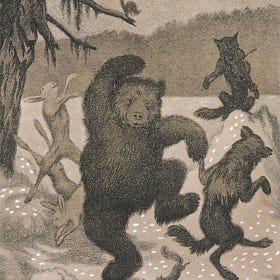Fanfare for Anarchism
A Home for the Homeless Mind
Occasionally you hear people complain about being ‘politically homeless’. What they tend to mean is either that there is no longer a traditional left-wing, which sought to manage people and nature in the name of a global ‘society’, or that there is no longer a traditional right-wing, which sought to subjugate people and nature in the name of a national ‘tradition’. The reason they’ve departed from political life is that in our neoliberal, postmodern, online unworld, society no longer exists, the Western working class has been either weakened or subsumed into the [decaying] middle-class and nations are now irrelevant, as are institutions, so there is no place left for either the ideology of the traditional management class (socialism) or for the traditional owner class (capitalism), and this has left those who still adhere to them, ‘homeless’. While such people remain blind to the true nature of the postmodern condition — a consequence of technocratic capitalism and technocratic socialism — they will be unable to even consider the only home that can ever welcome them; Anarchism…
Anarchism at the End of the World
An introduction to anarchism, the perennial instinct, the only way of life that has ever worked or ever can. It is the only actual alternative to the pseudo-alternatives of the left and right, of optimism and pessimism, and even of theism and atheism.
‘Perennial’ because nature is anarchist, friendship is anarchist, work is anarchist (when the boss is absent), romantic love is anarchist, scientific endeavour is anarchist, all primal (pre-agricultural, pre-conquest) societies were anarchist and artistic creation is anarchist. Life itself is anarchist, which explains why anarchistic forms of sociality surface again and again, throughout history, even in the teeth of the most oppressive social conditions imaginable. Anarchism springs up in prisons, in shanty towns, in peasant communes and even occasionally, and most amazingly, in the modern workplace. Anarchism sprouts through the cracks of the system as weeds do between its paving stones, because it represents the root and spring of our social nature.
You would think then that anarchism would be a popular way of life today. You would think that a movement which in essence includes all great artists and scientists1 would be extremely attractive. You’d think that a genuine alternative to the system-friendly managerialism of the left and the system-friendly capitalism of the right would be an easy pitch. You’d think that an approach to politics which, like the majority of populations everywhere, pushes leftwards economically (redistributing wealth) and rightwards socially (enforcing organic cultural borders), would find a great deal of popular support. You’d think! But I’m afraid you’d be wrong, for two basic reasons.
Firstly, most people do not want the spiritual and intellectual freedom that anarchism represents. It terrifies them. They want to avoid the crushing oppression of wordly life, but they cling to the institutions, the money, the capital, the comfort, the routine, the technology and the mindless work that are all preconditions of that life. What they are seeking is not freedom from systemic confinement, but reform within it — a better run prison, with nicer guards, cosier cells and some power within it to push other prisoners around. Generally speaking, those on the left seek power through management (and through knowledge), while those on the right seek power through property (and through violence),2 but nobody seek freedom from a system in which one cannot survive without such power, which is why the institutionalised inmates of our world all unite to crush genuine movement towards such freedom.3
We all love a rose in the garden, we love look upon its elegant form and to
inhale its gentle fragrance, but nature is not, in the first instance,
a rose in the garden, it is a trillion weeds on the motorway verge.
Everyone knows, instinctively, that anarchism represents the truth, which is why critics never directly address it (preferring to destroy it, ignore it, laugh at it or offer peripheral objections4) and why they colonise its surface form. This is the second reason anarchism is not popular, because it has been, like every other word which can express the truth co-opted, by traditional leftists (socialist thinkers—so called ‘anarcho-syndicalists’ like David Graeber, Noam Chomsky and, less seriously, Russell Brand), postmodern leftists (mainstream anarchism today is essentially a genderless, reasonless, borderless bastion of identity politics), the criminal underclass (the scrags that tend to accumulate in squats5 and shelters and who naturally gravitate to an ideology that seems to be against everything), and even, believe it or not, capitalists (the laughable oxymoron of ‘anarcho-capitalism’).
One reason actually existing anarchism is so easy to co-opt and misunderstand is that the word itself, ‘anarchism’—a society without leaders—is so misleading. Anarchist societies have, and must have, leaders and laws, even kings. Only a madman wants to sail on a leaderless boat. This is why I offer the term ‘primalism’, to distance the heart of anarchism from its various corrupted forms and overly simplistic forms (although the paradoxical neologism anarcho-monarchism would work just as well). In reality, anarchism can only work, as nature does, in a hierarchical structure. What distinguishes this structure from all the tyrannies we are familiar with is that it is extremely shallow, it is founded on being an authority (rather than merely being in authority) and, crucially, it is subordinate to context and consciousness, the only source of truth, intelligence, power and love in existence. Everyone intuitively knows this, which is why truth, intelligence, power and love are all coopted too.
Anarchism is therefore coopted for the same reason being an outsider is. In a decadent society on its last legs, nobody fits in, nobody belongs; which, naturally enough, everybody takes pride in. The quickest way out of feeling unpleasantly cruel, weak or fearful is to be proud of being a sadist, a weakling or a coward; and so it is with feeling lonely, bored, atomised and alienated — it’s easier to enjoy the idea that you’re a rebel than to actually rebel.6 Thus, the pose of genuine dissent only ever goes so far, never extending beyond the subgroup that one belongs to, one’s church (including the church of atheism), one’s political affiliation (including the ideology of neutrality) or one’s hobby set (including the popular pastime of being interested in nothing), which critical censure never seriously interrupts, as evidenced by the fact that the most ‘rebellious’ writers and artists never seriously jeopardise their popularity with their own readers.
Groupthink extends far beyond such localised affiliations though. A deeper, far more terrible conformity binds a much larger group — humanity itself — which, no matter how conspicuously its constituent nations, factions and institutions conflict, no matter how diverse its individuals appear to be, rests upon a single, selfish foundation, a sad, selfish, miserable omniself, which, when prodded, responds with the same egoic fear and violence. The same unconscious emotionality, the same fear of ridicule, the same anxiety at being alive, the same wilful unhappiness, the same proud stupidity, the same mediocre craving for stimulation or attention. The same, the same, the same. And this featureless, domesticated monoself knows it’s the same, which is why it so desperately reaches out for a reason to seem different, a rebellious badge it can wear that sets it apart from the unhappy mass it secretly knows it is part of.
The free individual is as rare in the world as the wild animal — and his fate is the same — which is why the one political ideology which addresses the free individual, anarchism, is hated, feared and co-opted, made to look like a rather more exciting version of democratic socialism, with much gladness, tolerance, body-positivity, pacifism and play, but all under the roof of a technocratic institution, or compelled by a pitiless capitalist economy. Anarchism, as an honest proposition, will never be presented to people as it is, as a natural principle, common to us all, or as a profound and inspiring philosophy of existence — far deeper than mere politics — and it will never be accepted by a domesticated mass.
But it doesn’t have to be, for, ultimately, anarchism is not a proposition. It is life itself, the social expression of nature. It does not therefore need to be argued for, organised, voted for, pushed or promoted. Put your feet up! Like nature, anarchism will emerge by itself when the conditions for doing so allow it — is already emerging, reaching through the cracks in the pavement of the system. True, this is very difficult to see, in the winter of our world, when visible culture is as dead as the wilderness we crave. But for those who have learnt to look under the surface, life still seeths, even in the wasteland. Even here, in this little room, the day has come.
See also
The Truth About The Truth About Primitive Life
Was primal society superior to civilised life? Although Ted Kaczynski, the infamous unabomber, wrote a perceptive critique of modern life enthusiastically taken up by ‘anarcho-primitivists’, he argued, in ‘The Truth About Primitive Life’ that it wasn’t, that primitive life was a violent grind. One cannot discount Kaczynski’s arguments, but they are severely flawed…
Yes, all of them, but by ‘in essence’ I mean when they are at their most creative — not necessarily in their political opinions, or lack thereof. Many anarchists rarely discuss politics or social theory and the like, and have no interest in them at all.
And everyone, left and right, seeks power through prestige, or fame, but all this power and comfort tends to make people feel guilty, which is why their prisons must have charities, welfare and the like.
The most famous case in recent history was the Spanish anarchist revolution of the 1930s which was slaughtered by the nationalist right and asphyxiated by the republican / communist left. The situation was similar in the Russian revolution, but you don’t need to journey into history to find cases of the left and right uniting to prevent even the slightest movement towards genuine independence. This is why socialists and capitalists alike tend to oppose home schooling, for example, or self-medication, or genuine self-governance.
I’m referring here to the typical British squat. I’ve lived in inspiring, well-organised, socially diverse squats.
Another analogy is the co-option of basic decency. Everyone knows that it is morally wrong to be fundamentally selfish, which is why everyone, no matter how abominably, laughably, ridiculously self-obsessed they are, tells themselves that they are fundamentally selfless, honest and fair. It can boggle the mind to hear moral cowards and monsters justify themselves in this way, until you grasp that basic decency has to be co-opted by those without it.




